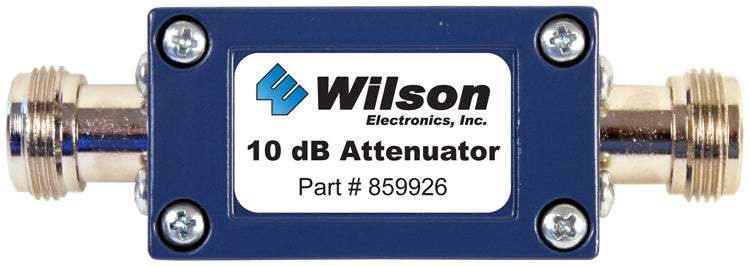Wilson 859926 10 dB Attenuator
Your Order Includes:
- 90-Day Returns
- Lifetime Tech Support
- 2-Year Warranty
- Lowest Price Guarantee
How to Choose the Right Antennas for Your Booster
Outside Antennas:
- Yagi Directional Antenna: This antenna is more powerful because it focuses on sending and receiving signals in one direction. It works best when there are no major obstacles blocking its path to the cell tower. It's not ideal for areas with large obstructions like hills or buildings.
- Omni Antenna: This antenna sends and receives in all directions, so it's better for hilly areas or if you need to support multiple carriers with towers in different directions. It doesn’t need to be aimed, but it also isn’t as strong as the Yagi antenna.
- High Gain LPDA Antenna: Perfect for areas with very weak signals, this antenna significantly boosts signal strength. It needs a clear line of sight to the cell tower and requires a sturdy mount because of its size.
- High Gain Omni Antenna: Similar to the standard omni, this antenna receives signal from all directions but delivers significantly higher gain across all supported bands. It’s a much stronger option when you want more inside coverage than a standard omni will provide, especially in areas with weaker outside signal.
Inside Antennas:
- Panel Antenna: Can be placed on walls or ceilings and directs the signal towards a specific area. This antenna is great for homes and tall ceilings in buildings.
- Standard Dome Antenna: Designed to be mounted on the ceiling, this antenna spreads the signal evenly throughout the area. It's best suited for drop ceilings or spaces where cables can be run above the ceiling.
- Ultra-Thin Dome Antenna: This slim antenna also mounts to the ceiling, but is much is less noticeable. It's much stronger than a standard dome antenna, making it a great choice for places where both looks and signal strength are important.
Tips for Choosing:
- Choose Omni Antennas for general coverage with no aiming required.
- Choose Directional Antennas (Yagi or LPDA) when you can point directly at a cell tower and need stronger signal and more inside coverage.
- Interior Size Considerations: One antenna per 750-1,500 sq ft in homes, or 1,500-2,500 sq ft in open spaces like offices and warehouses.
Product Overview
Product Overview
The Wilson 859926 10 dB Attenuator is a crucial component for optimizing cellular signal booster performance. Designed to reduce signal power by 10 dB, it helps manage overly strong signals that might otherwise interfere with signal booster functionality. This controlled reduction of signal strength ensures that the signal booster operates efficiently within its optimal range, thereby enhancing the overall performance of the system and preventing issues such as overloading or feedback.
- Precise Signal Control: Provides a consistent 10 dB reduction, crucial for maintaining the effectiveness of signal boosters in environments where signal strength is high.
- Compatibility: Easily integrates with a variety of cellular signal boosters, ensuring broad applicability.
- Enhanced System Performance: By moderating signal strength, it helps avoid common problems like booster overload and feedback, improving reliability and efficiency.
- Easy to Install: Designed for simple installation, allowing for quick setup and immediate improvement in system operation.
This attenuator is an excellent solution for anyone looking to fine-tune their cellular signal booster setup, ensuring that it delivers the best possible performance without the complications of an overly strong incoming signal.
Specifications
Specifications
-
SKU859926
-
UPC813986005255
-
ConditionNew
-
Impedance
-
ConnectorN-Female

